Photostat copy of diaries of Benjamin Bennett Leane, 1915-1916 - Part 19
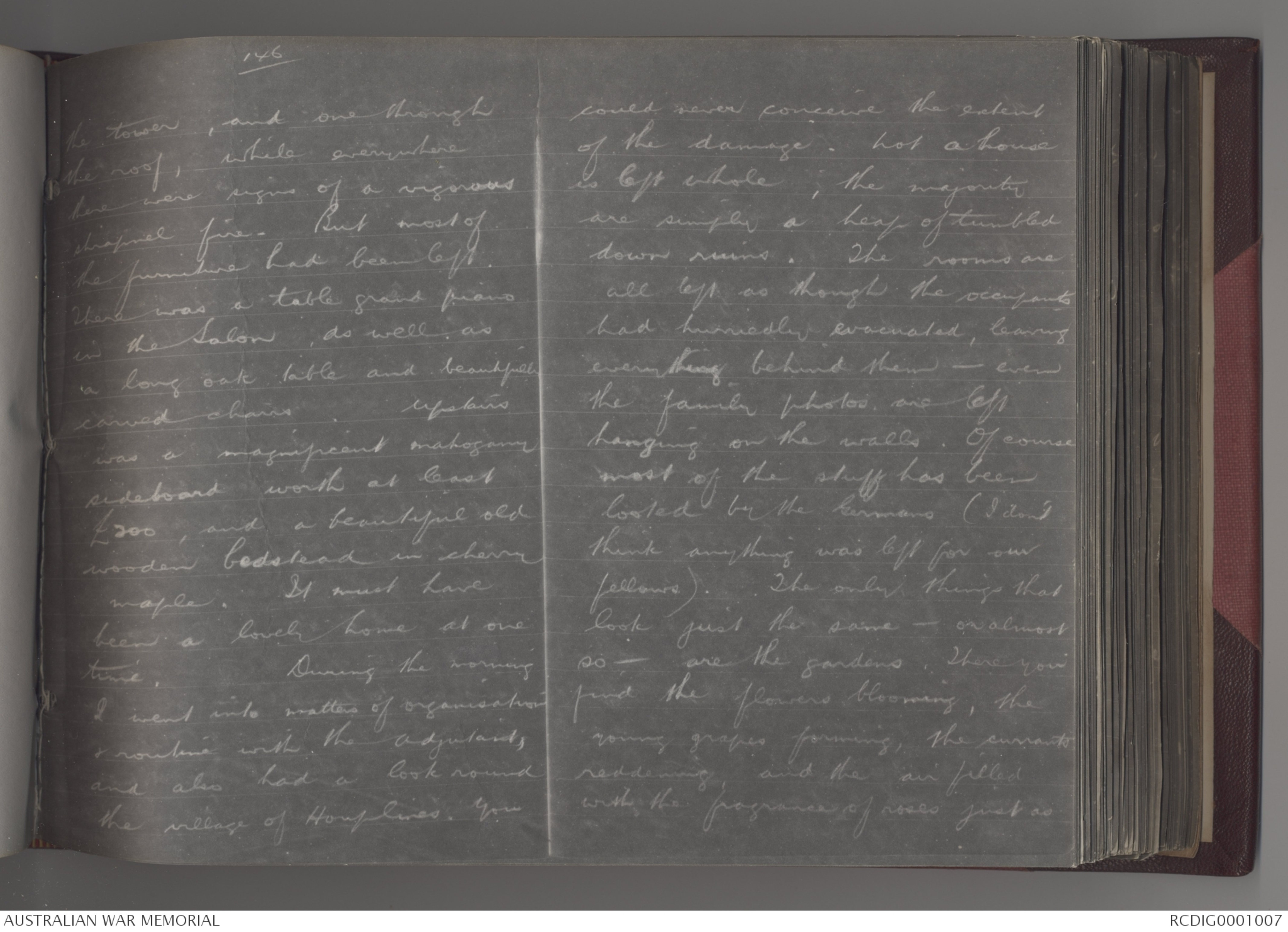
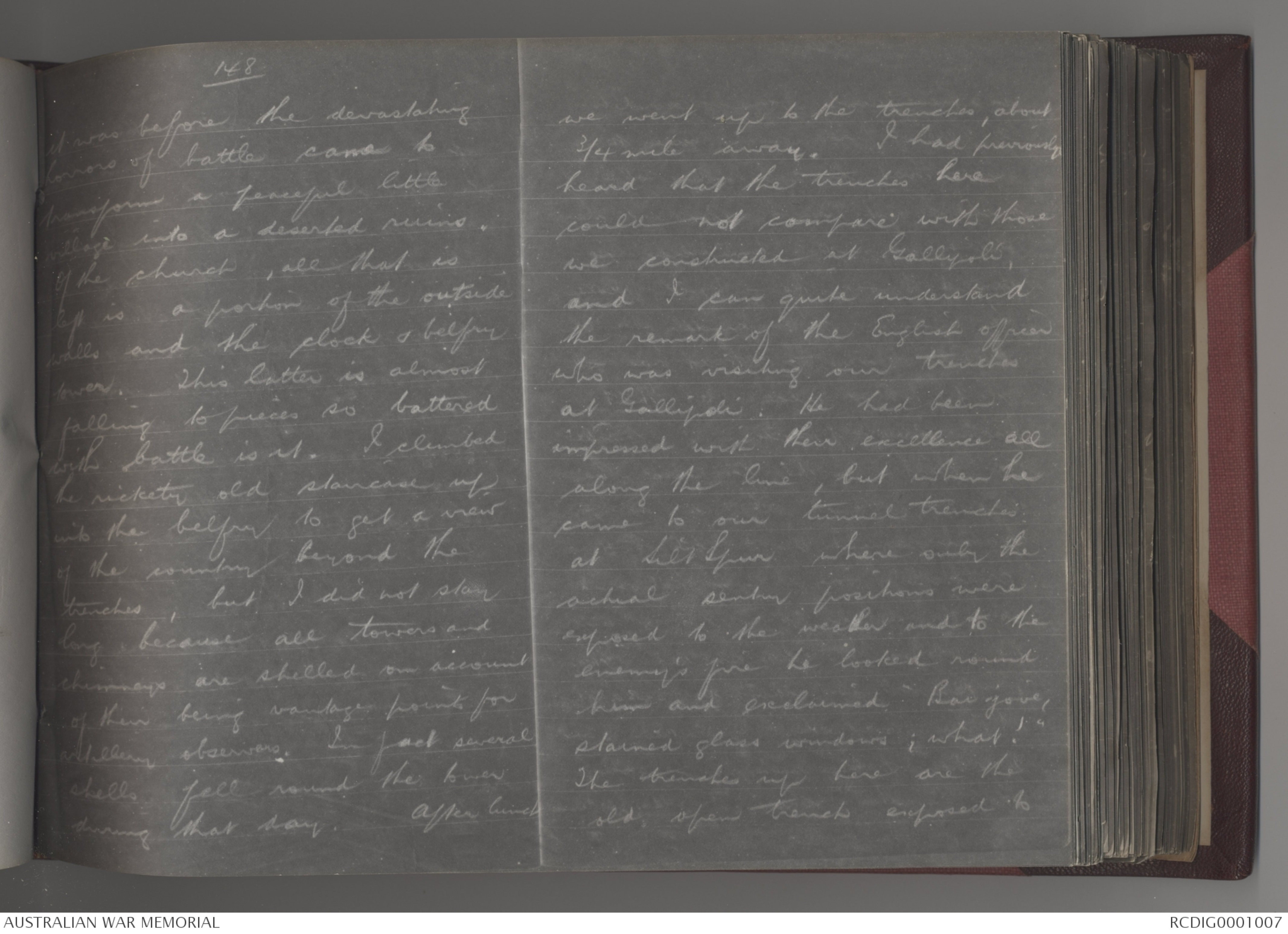
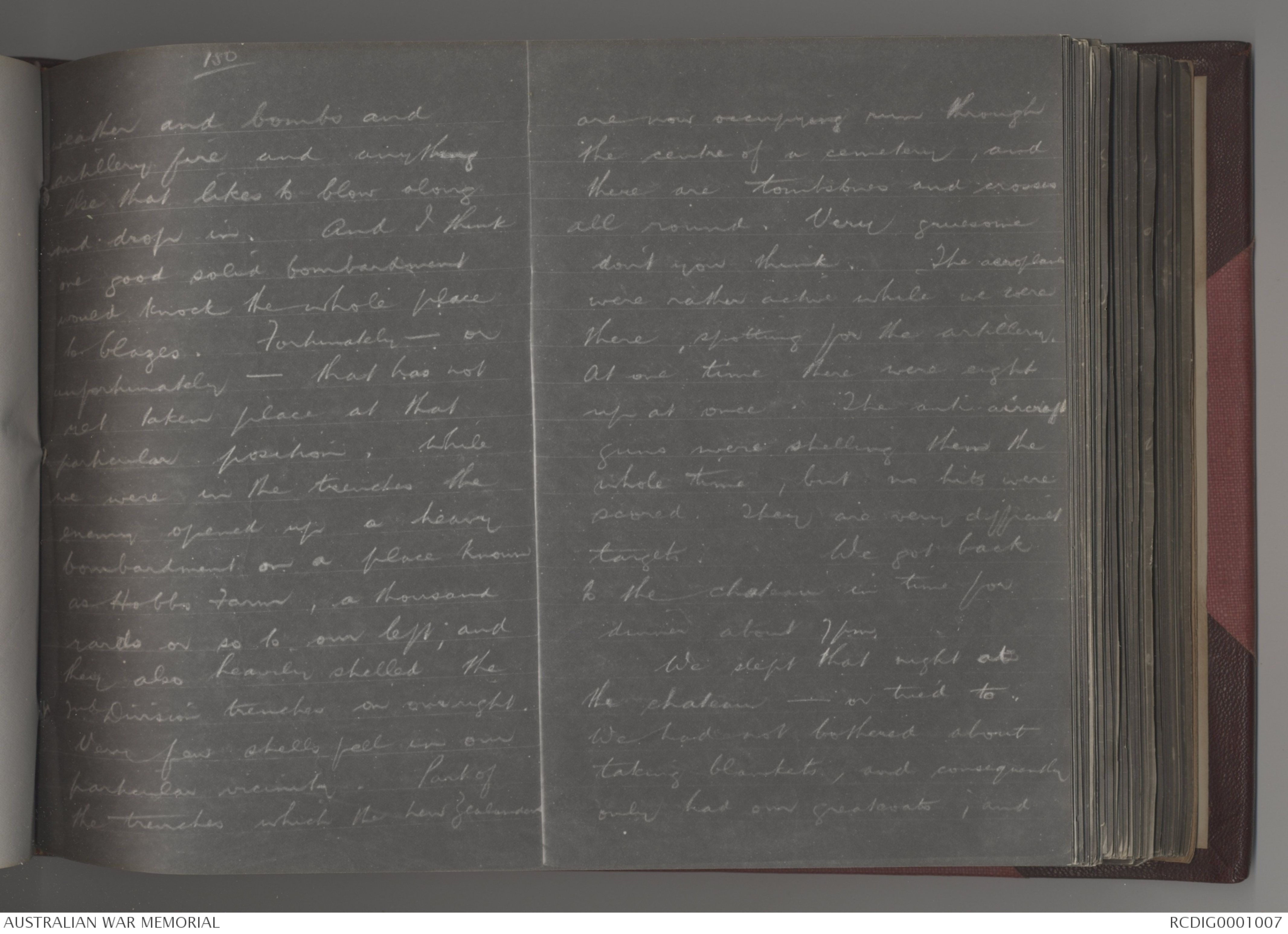
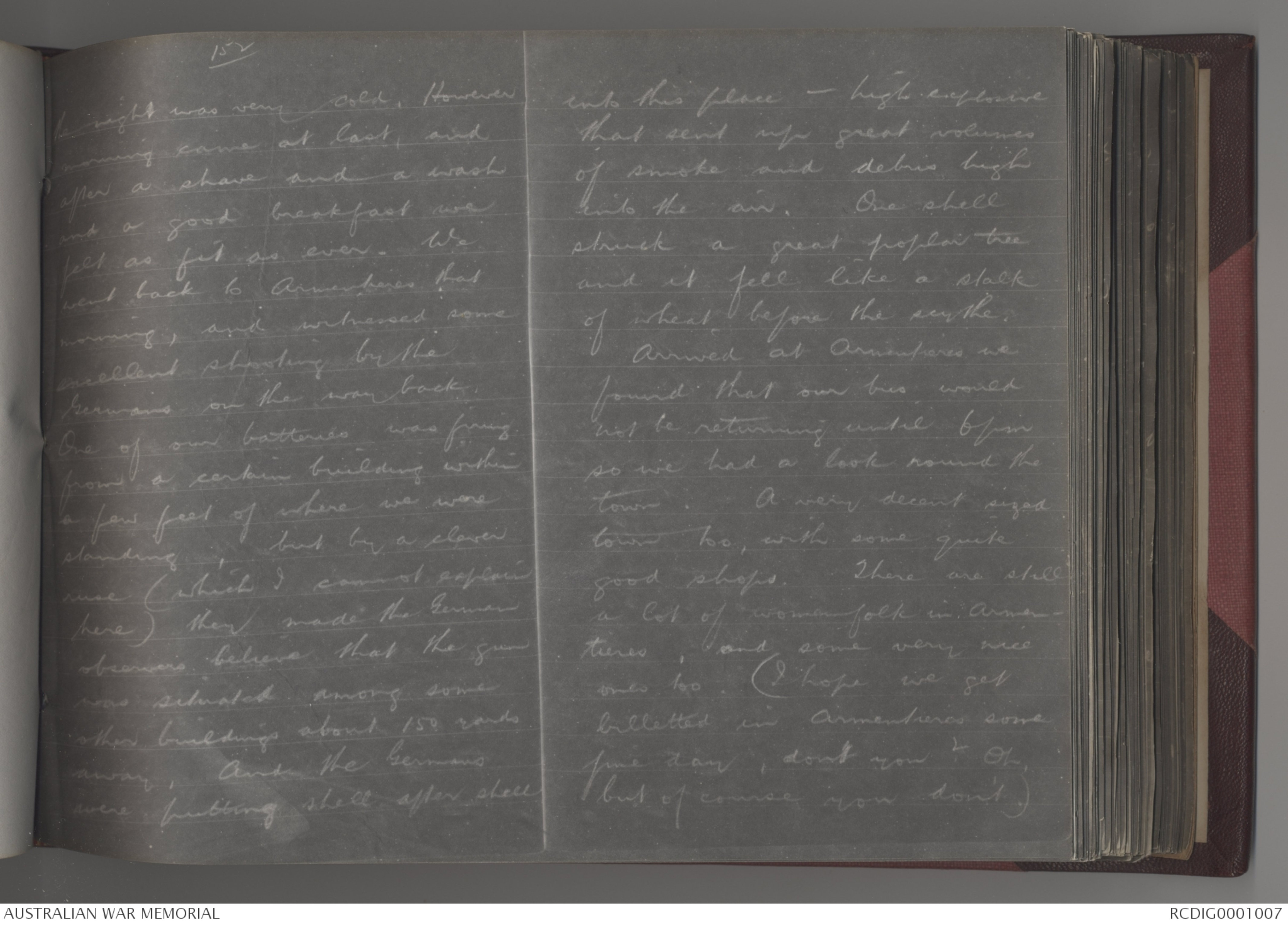
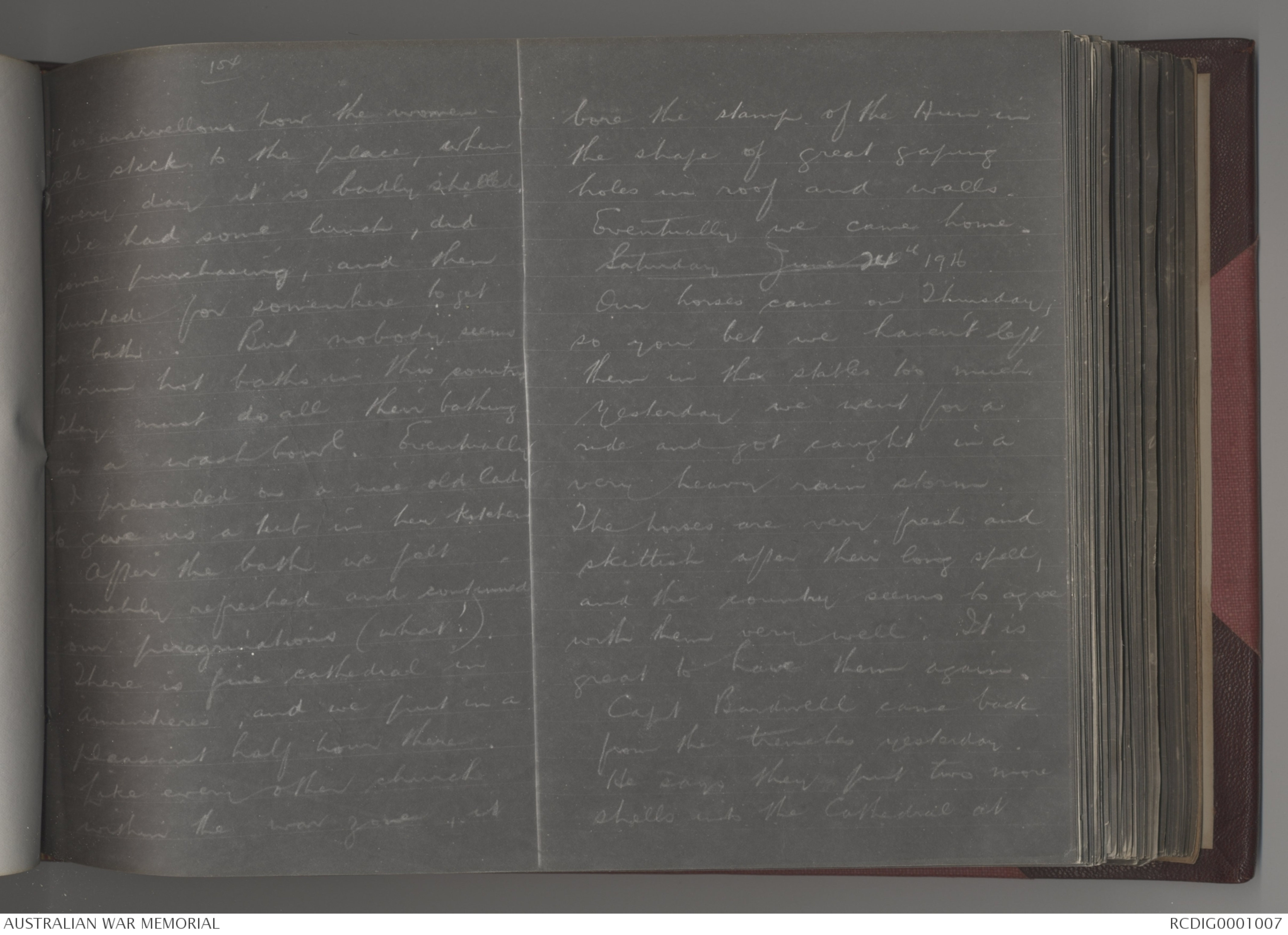
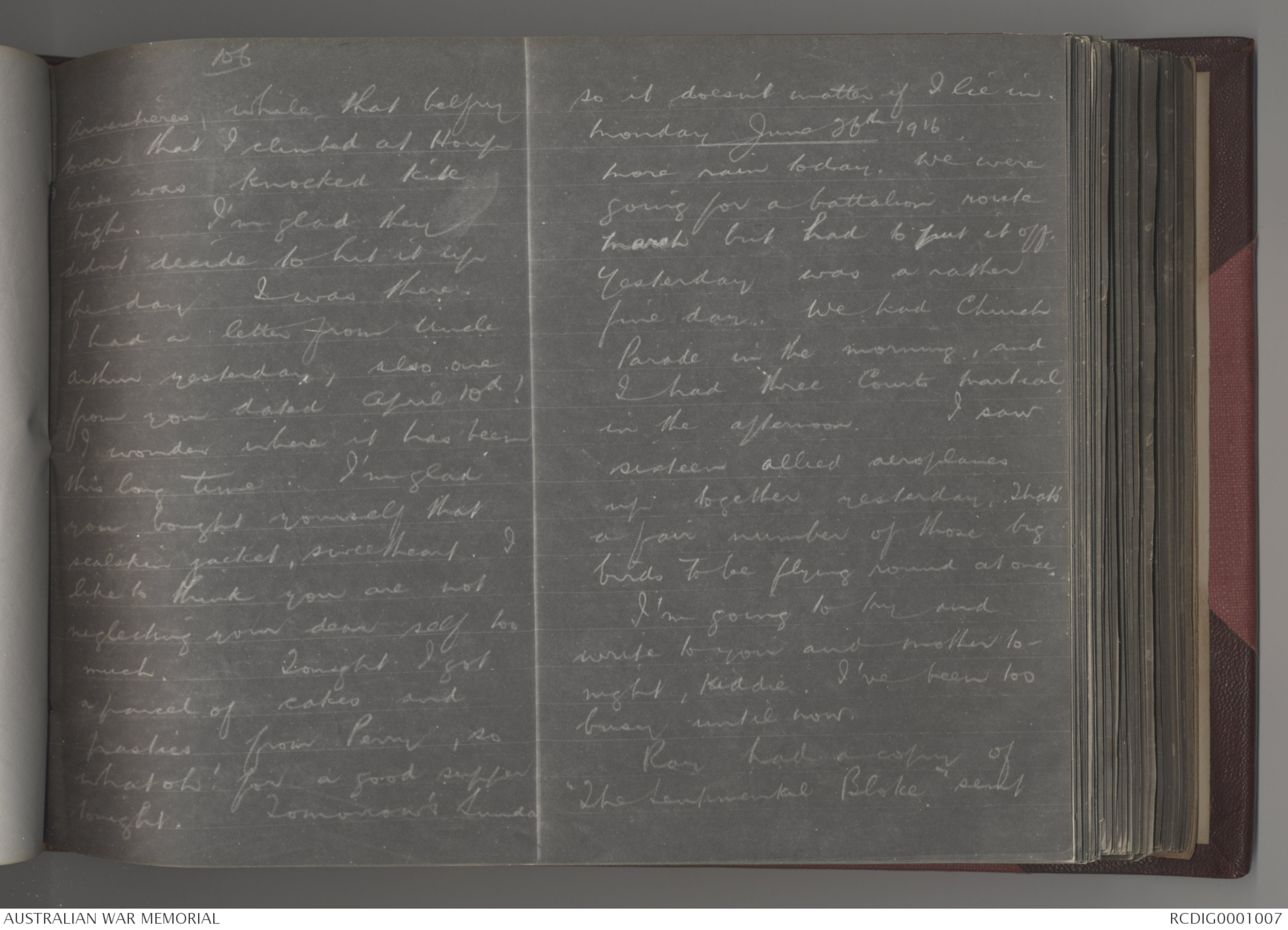
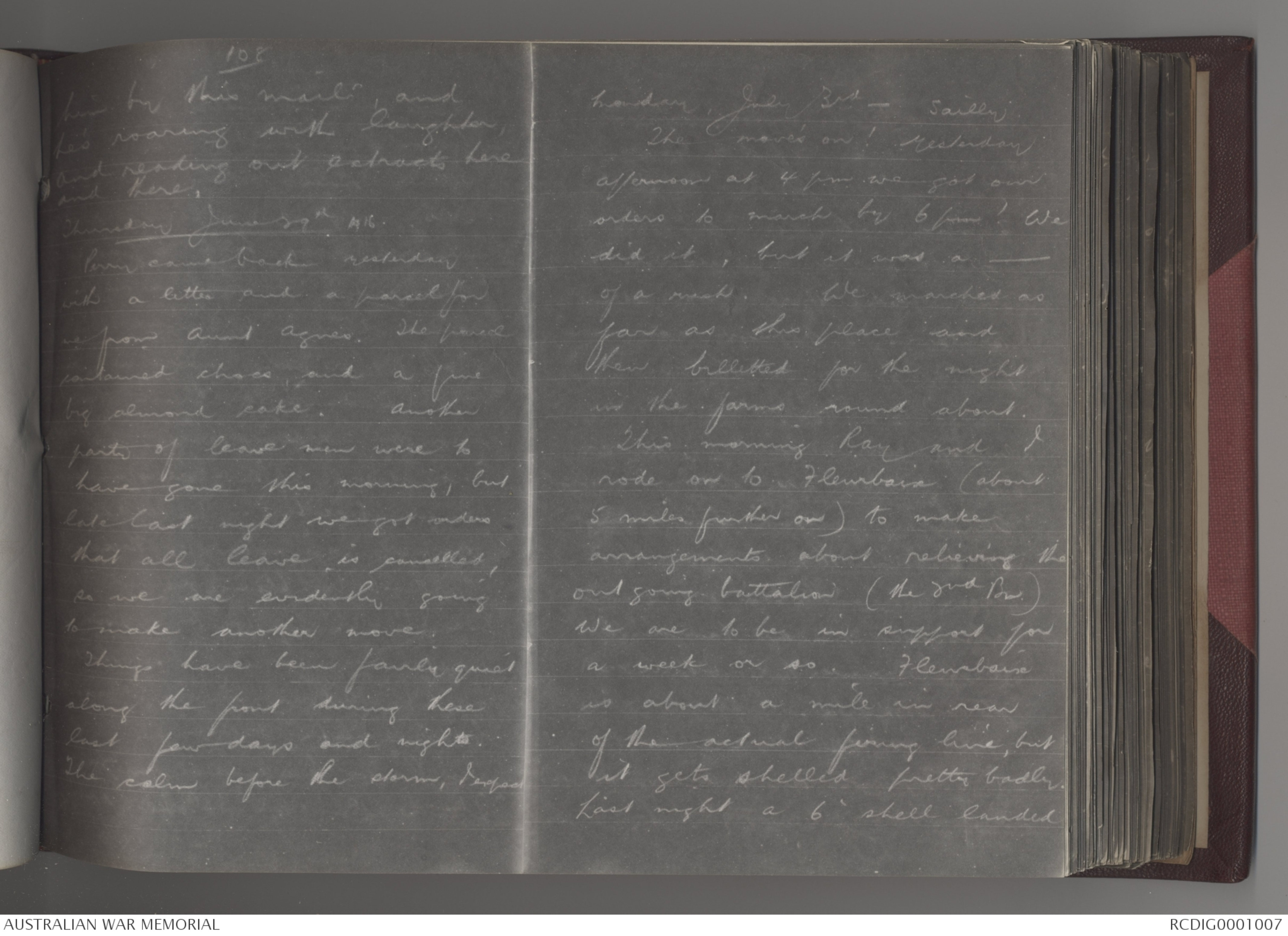
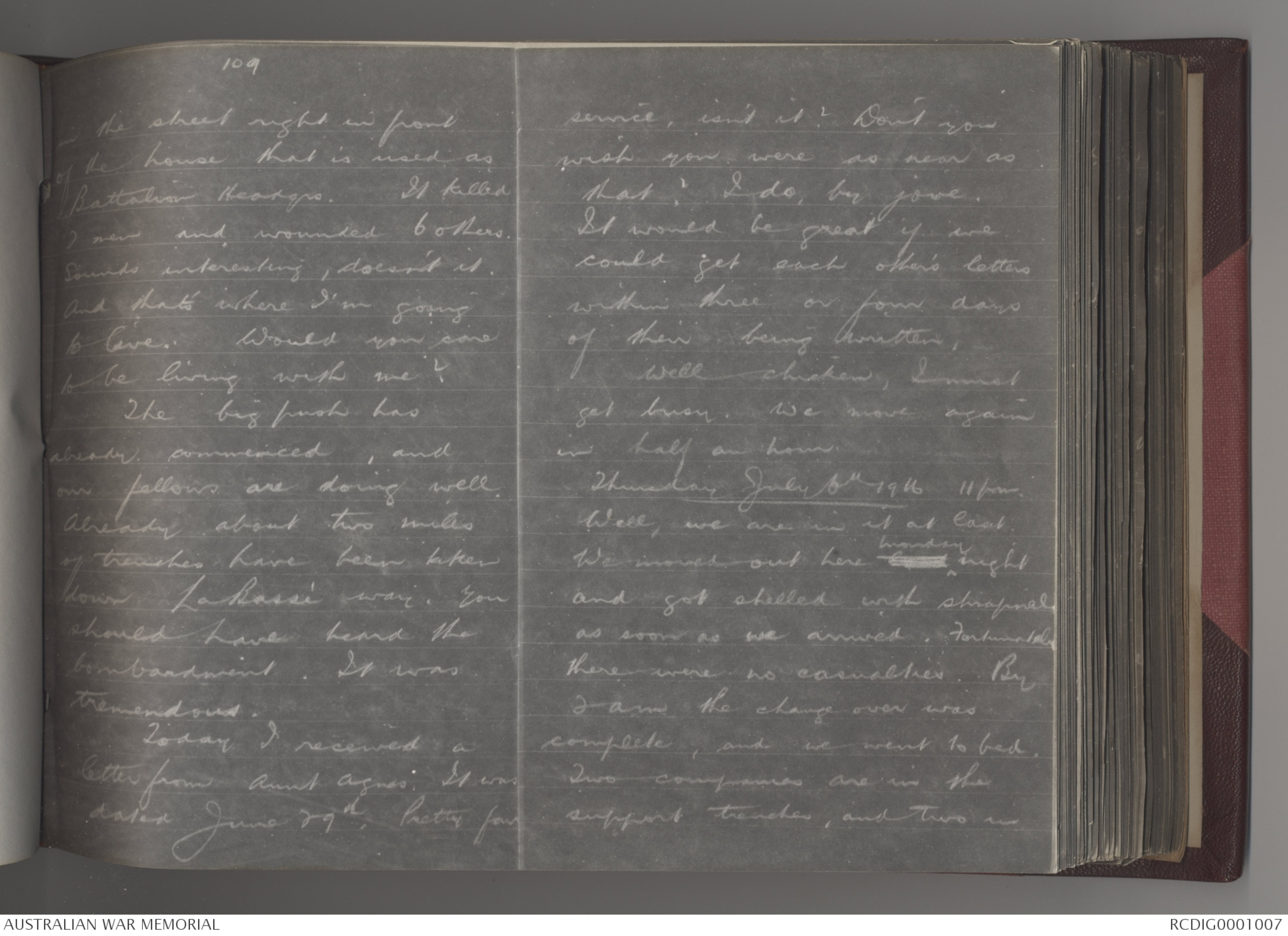
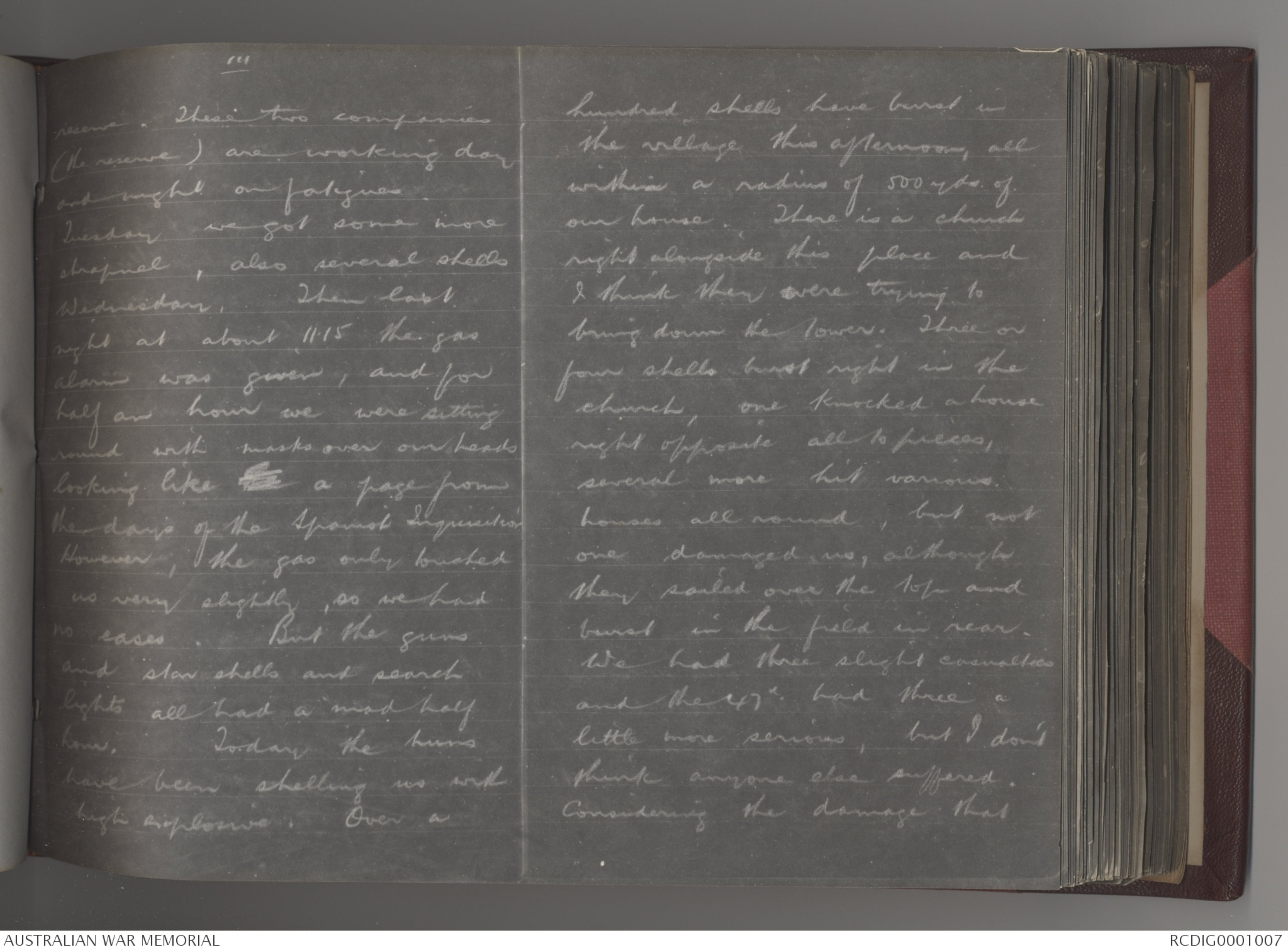
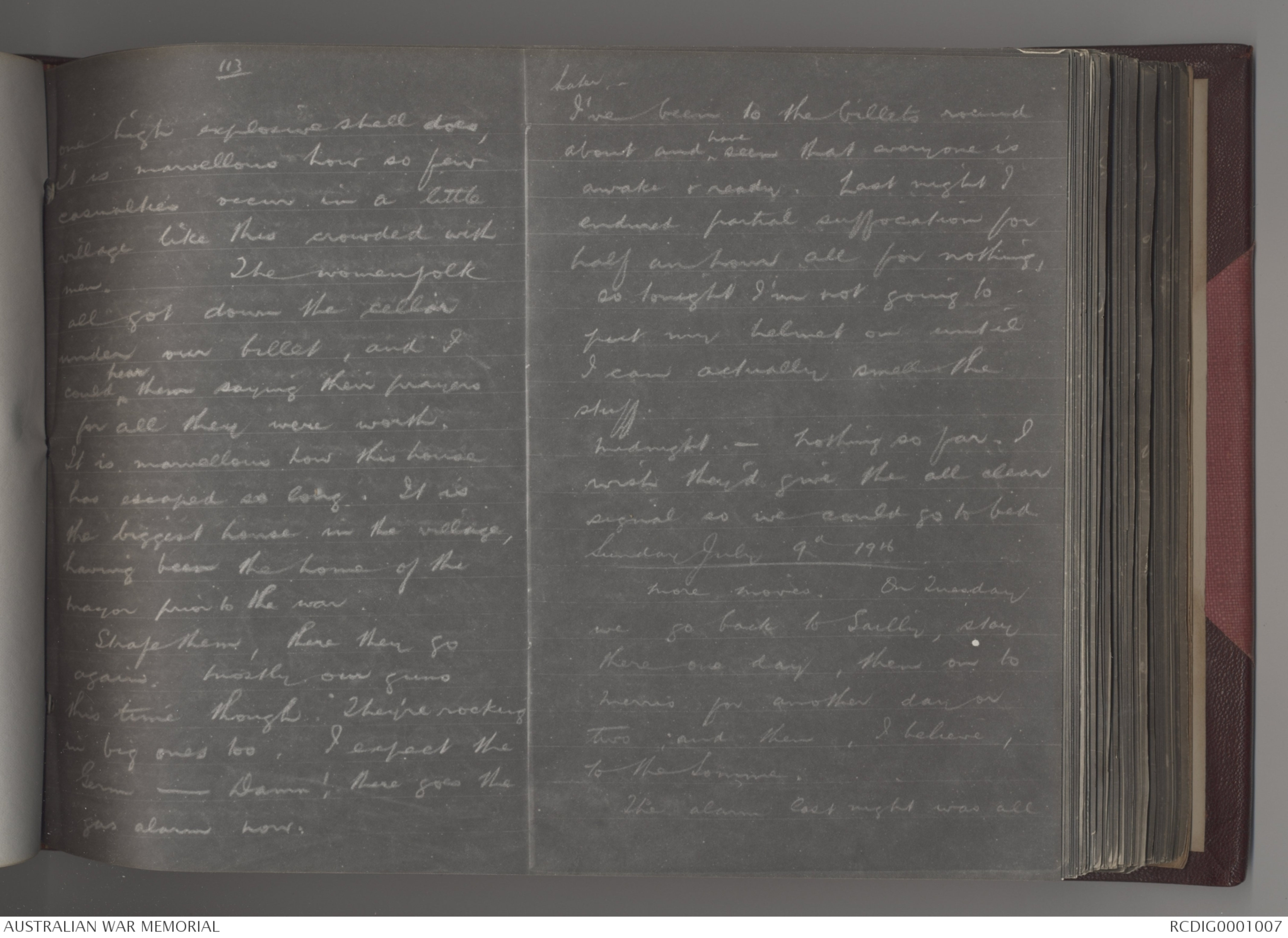
146
the tower, and one through
the roof, while everywhere
here were signs of a vigorous
shrapnel fire. But most of
the furniture had been left.
There was a table grand piano
in the Salon, as well as
a long oak table and beautiful
carved chairs. Upstairs
was a magnificent mahogany
sideboard worth at least
£200, and a beautiful old
wooden bedstead in cherry
maple. It must have
been a lovely home at one
time. During the morning
I went into matters of organisation
& routine with the adjutant,
and also had a look round
the village of Houplines. You
could never conceive the extent
of the damage. Not a house
is left whole, the majority
are simply a heap of tumbled
down ruins. The rooms are
all left as though the occupants
had hurriedly evacuated, leaving
everything behind them - even
the family photos are left
hanging on the walls. Of course
most of the stuff has been
looted by the Germans (I don't
think anything was left for our
fellows). The only things that
look just the same - or almost
so - are the gardens. There you
find the flowers blooming, the
young grapes forming, the currants
reddening, and the air filled
with the fragrance of roses just as
148
it was before the devastating
horrors of battle came to
transform a peaceful little
village into a deserted ruins.
Of the church, all that is
left is a portion of the outside
walls and the clock & belfry
tower. This latter is almost
falling to pieces so battered
with battle is it. I climbed
the rickety old staircase up
into the belfry to get a view
of the country beyond the
trenches, but I did not stay
long, because all towers and
chimneys are shelled on account
of them being vantage points for
artillery observers. In fact several
shells fell round the tower
during that day. After lunch
we went up to the trenches, about
¾ mile away. I had previously
heard that the trenches here
could not compare with those
we constructed at Gallipoli,
and I can quite understand
the remark of the English Officer
who was visiting our trenches
at Gallipoli. He had been
impressed with their excellence all
along the line, but when he
came to our tunnel trenches
at Silt Spur where only the
actual sentry positions were
exposed to the weather and to the
enemy's fire he looked round
him and exclaimed "Bai jove,
stained glass windows; what!"
The trenches up here are the
old open trench exposed to
150
weather and bombs and
artillery fire and anything
else that likes to blow along
and drop in. And I think
one good solid bombardment
would knock the whole place
to blazes. Fortunately - or
unfortunately - that has not
yet taken place at that
particular position. While
we were in the trenches the
enemy opened up a heavy
bombardment on a place known
as Hobbs Farm, a thousand
yards or so to our left; and
they also heavily shelled the
2nd Division trenches on our right.
Very few shells fell in our
particular vicinity. Part of
the trenches which the New Zealanders
are now occupying run through
the centre of a cemetery, and
there are tombstones and crosses
all round. Very gruesome
don't you think. The aeroplanes
were rather active while we were
there, spotting for the artillery.
At one time there were eight
up at once. The anti-aircraft
guns were shelling them the
whole time, but no hits were
scored. They are very different
targets. We go back
to the chateau in time for
dinner about 7 pm.
We slept that night at
the chateau - or tried to.
We had not bothered about
taking blankets, and consequently
only had our greatcoats; and
152
the night was very cold. However
morning came at last, and
after a shave and a wash
and a good breakfast we
felt as fit as ever. We
went back to Armentieres that
morning, and witnessed some
excellent shooting by the
Germans on the way back.
One of our batteries was firing
from a certain building within
a few feet of where we were
standing, but by a clever
ruse (which I cannot explain
here) they made the German
observers believe that the gun
was situated among some
other buildings about 150 yards
away. And the Germans
were putting shell after shell
into this place - high explosive
that sent up great volumes
of smoke and debris high
into the air. One shell
struck a great poplar tree
and it fell like a stalk
of wheat before the scythe.
Arrived at Armentieres we
found that our bus would
not be returning until 6 pm
so we had a look round the
town. A very decent sized
town too, with some quite
good shops. There are still
a lot of woman folk in Armentieres,
and some very nice
ones too (I hope we get
billetted in Armentieres some
fine day, don't you? Oh
but of course you don't)
154
It is marvellous how the womenfolk
stick to the place, when
every day it is badly shelled.
We had some lunch, did
some purchasing, and then
hunted for somewhere to get
a bath. But nobody seems
to run hot baths in this country.
They must do all their bathing
in a wash bowl. Eventually
I prevailed on a nice old lady
to give us a tub in her kitchen.
After the bath we felt
muchly refreshed and continued
our peregrinations (what!).
There is fine cathedral in
Armentieres, and we put in a
pleasant half hour there.
Like every other church
within the war zone, it
bore the stamp of the Hun in
the shape of great gaping
holes in the roof and walls.
Eventually we came home.
Saturday June 24th 1916.
Our horses came on Thursday,
so you bet we haven't left
them in the stables too much.
Yesterday we went for a
ride and got caught in a
very heavy rain storm.
The horses are very fresh and
skittish after their long spell,
and the country seems to agree
with them very well. It is
great to have them again.
Capt. Bardwell came back
from the trenches yesterday.
He says they put two more
shells into the Cathedral at
106
Armentieres, while that belfry
tower that I climbed at Houplines
was knocked kite
high. I'm glad they
didn't decide to hit it up
the day I was there.
I had a letter from Uncle
Arthur yesterday, also one
from you dated April 10th !
I wonder where it has been
this long time. I'm glad
you bought yourself that
sealskin jacket, sweetheart. I
like to think you are not
neglecting your dear self too
much. Tonight I got
a parcel of cakes and
pasties, from Perry, so
what oh! for a good supper
tonight. Tomorrow's Sunday
so it doesn't matter if I lie in.
Monday June 26th 1916.
More rain today. We were
going for a battalion route
march but had to put it off.
Yesterday was a rather
fine day. We had Church
Parade in the morning, and
I had three Courts Martial
in the afternoon. I saw
sixteen allied aeroplanes
up together yesterday. That's
a fair number of those big
birds to be flying round at once.
I'm going to try and
write to you and mother tonight,
Kiddie. I've been too
busy until now.
Ray had a copy of
"The Sentimental Bloke" sent
108
him by this mail, and
he's roaring with laughter,
and reading out extracts here
and there.
Thursday June 27th 1916.
Perry came back yesterday
with a letter and a parcel for
me from Aunt Agnes. The parcel
contained chocs, and a fine
big almond cake. Another
party of leave men were to
have gone this morning, but
late last night we got orders
that all leave is cancelled,
as we are evidently going
to make another move.
Things have been fairly quiet
along the front during these
past few days and nights.
The calm before the storm, I expect.
Monday, July 3rd - Sailly
The move's on! Yesterday
afternoon at 4 pm we got our
orders to march by 6 pm! We
did it, but it was a ___
of a rush. We marched as
far as this place and
then billetted for the night
in the farms round about.
This morning Ray and I
rode on to Fleurbaix (about
5 miles further on) to make
arrangements about relieving the
out going battalion (the 2nd Bn.)
We are to be in support for
a week or so. Fleurbaix
is about a mile in rear
of the actual firing line, but
it gets shelled pretty badly.
Last night a 6" shell landed
109
in the street right in front
of the house that is used as
Battalion Headqrs. It killed
7 men and wounded 6 others.
Sounds interesting, doesn't it.
And that's where I'm going
to live. Would you care
to be living with me?
The big push has
already commenced, and
our fellows are doing well.
Already about two miles
of trenches have been taken
down La Bassé way. You
should have heard the
bombardment. It was
tremendous.
Today I received a
letter from Aunt Agnes. It was
dated June 29th. Pretty poor
service, isn't it? Don't you
wish you were as near as
that? I do, by jove.
It would be great if we
could get each other's letters
within three or four days
of their being written.
Well chicken, I must
get busy. We move again
in half an hour.
Thursday July 6th 1916 11 pm.
Well, we are in at last.
We moved out here last ∧Monday night
and got shelled with shrapnel
as soon as we arrived. Fortunately,
there were no casualties. By
2 am the change over was
complete, and we went to bed.
Two companies are in the
support trenches, and two in
111
reserve. These two companies
(the reserve) are working day
and night on fatigues.
Tuesday we got some more
shrapnel, also several shells
Wednesday. Then last
night at about 11.15 the gas
alarm was given, and for
half an hour we were sitting
round with masks over our heads
looking like xxx a page from
the days of the Spanish Inquisition.
However, the gas only touched
us very slightly, so we had
no cases. But the guns
and star shells and search
lights all had a mad half
hour. Today the huns
have been shelling us with
high explosive. Over a
hundred shells have burst in
the village this afternoon, all
within a radius of 500 yds of
our house. There is a church
right alongside this place and
I think they were trying to
bring down the tower. Three or
four shells burst right in the
church, one knocked a house
right opposite all to pieces,
several more hit various
houses all round, but not
one damaged us, although
they sailed over the top and
burst in the field in rear.
We had three slight casualties
and the 47th had three a
little more serious, but I don't
think anyone else suffered.
Considering the damage that
113
one high explosive shell does,
it is marvellous how so few
casualties occur in a little
village like this crowded with
men. The womenfolk
all got down the cellar
under our billet, and I
could ∧ hear them saying their prayers
for all they were worth.
It is marvellous how this house
has escaped so long. It is
the biggest house in the village,
having been the home of the
Mayor prior to the war.
Strafe them, there they go
again. Mostly our guns
this time though. They're rocking
in big ones too. I expect the
Germ ___ Damn! There goes the
gas alarm now.
Later -
I've been to the billets round
about and ∧ have] seen that everyone is
awake & ready. Last night I
endured partial suffocation for
half an hour all for nothing,
as tonight I'm not going to
put my helmet on until
I can actually smell the
stuff.
Midnight - Nothing so far. I
wish they'd give the all clear
signal so we could go to bed.
Sunday July 9th 1916.
More moves. On Tuesday
we go back to Sailly, stay
there one day, then on to
Merris for another day or
two; and then, I believe,
to the Somme.
The alarm last night was all
 Loretta Corbett
Loretta CorbettThis transcription item is now locked to you for editing. To release the lock either Save your changes or Cancel.
This lock will be automatically released after 60 minutes of inactivity.